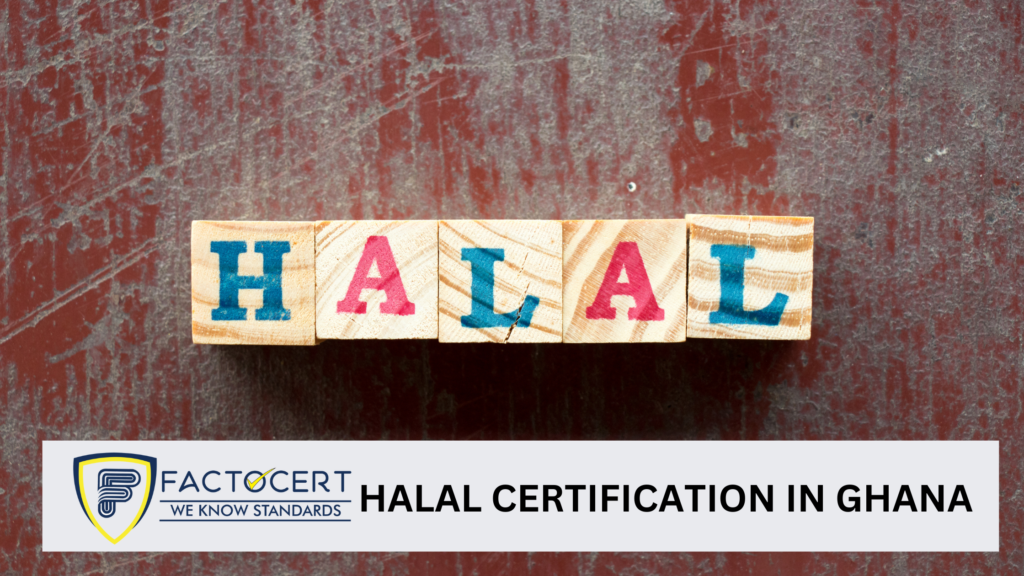The Importance of Halal Certification in Ghana
Halal Certification in Ghana for Muslims around the world, consuming food and using products that adhere to Islamic guidelines is a core aspect of their faith. This concept of permissibility is captured by the term “Halal,” which translates to “lawful” or “permitted” in Arabic. In today’s globalized world, where food chains crisscross continents and product ingredients can be complex, Halal certification has emerged as a vital tool for Muslim consumers seeking peace of mind. This is particularly true in Ghana, a nation with a growing Muslim population and a burgeoning Halal industry.
Halal certification and religious observance in Ghana
At its heart, Halal certification goes beyond simply ensuring the absence of pork and alcohol. It encompasses the entire production process, from sourcing ingredients to slaughtering animals (for meat products) to using additives and processing techniques. Islamic law (Sharia) dictates specific guidelines for these aspects, ensuring humane treatment of animals, avoidance of harmful substances, and adherence to cleanliness standards.
For Ghanaian Muslims, Halal certification provides a trusted guarantee that the products they consume and use are permissible according to their faith and uphold ethical and responsible production practices. This fosters a sense of religious fulfillment and allows them to make informed purchasing decisions based on their beliefs.
The benefits of Halal certification in Ghana extend beyond religious observance.
The significance of Halal certification extends beyond the realm of religious adherence. Here are some of the key benefits it offers:
- Transparency: The certification process involves rigorous inspections illuminating the production chain. This fosters transparency for consumers, allowing them to make informed choices about the products they buy.
- Safety and Hygiene: Halal standards emphasize cleanliness and hygiene throughout production. This, in turn, contributes to the overall safety of the food and products consumers purchase.
- Quality Assurance: Many Halal certification bodies have stringent quality control measures. This ensures that certified products often meet high standards, giving consumers confidence in their purchases.
Ghana’s Growing Halal Market: A Lucrative Opportunity
Ghana boasts a significant Muslim population, around 20-25%. This translates to a growing demand for Halal-certified products. As Ghanaian consumers become more health-conscious and discerning, the value of Halal certification transcends religious significance. The emphasis on ethical sourcing, responsible production, and hygiene resonates with a broader audience, creating a wider market for Halal-certified goods.
Business benefits of Halal certification in Ghana
For businesses operating in Ghana, obtaining Halal certification presents a wealth of opportunities:
- Market Expansion: By acquiring Halal certification, businesses can tap into the vast and lucrative global Halal market, estimated to be worth over $2 trillion. This opens doors to new customer segments and export possibilities.
- Enhanced Brand Image: The Halal certification mark signifies trust and ethical practices. This can significantly improve a brand’s image among Muslim consumers and potentially attract non-Muslim customers who value ethical production.
- Competitive Advantage: Halal certification can set a business apart from its competitors in a crowded marketplace. It demonstrates a commitment to catering to a specific consumer segment and fosters brand loyalty.
The Halal Certification in Ghana
The landscape of Halal certification in Ghana is evolving. Several local and international Halal certification bodies operate within the country. Some of the prominent bodies include the Ghana Standards Authority (GSA), the Islamic Council for Development and Humanitarian Services (ICODEHS), and international bodies like the Emirates Authority for Standardization and Metrology (ESMA).
Businesses and consumers must ensure the chosen certification body is reputable and adheres to internationally recognized Halal standards.
Challenges and the Road Ahead
Despite its growing importance, Halal certification in Ghana faces some challenges. Standardization across certification bodies and consumer awareness regarding certification marks require ongoing improvement. Additionally, ensuring efficient and transparent certification processes remains a focus area.
Conclusion
Halal certification is vital in Ghana, ensuring religious adherence for Muslim consumers and fostering a culture of responsible and ethical production practices. As the Ghanaian Halal market expands, collaboration between certification bodies, businesses, and consumers will create a robust and transparent ecosystem that benefits all stakeholders. By embracing the true essence of Halal – encompassing religious observance, ethical sourcing, and quality assurance, Ghana can position itself as a leader in the global Halal market. Halal Certification in Nigeria
Why Factocert for Halal Certification in Ghana
We provide the best Halal consultants in Ghana Who are knowledgeable and provide the best solution. And how to get Halal certification. Kindly reach us at contact@factocert.com. Halal certification consultants work according to Halal standards and help organizations implement Halal certification with proper documentation.
For more information, visit Halal Certification in Ghana.
Frequently Asked Questions
What is ISO Certification in Ghana?
The ISO Certification in Oman stands for International Organization for Standardization. It plays an essential role in maintaining various market sectors’ standards. It starts right from manufacturing an item to providing a product. It is an independent, international organization that develops standards for ensuring the safety, quality, and efficiency of the services and products across Ghana cities like Accra, Kumasi, Tamale, Cape Coast, Ashaiman, and other major cities.
Who Needs ISO Certification in Ghana?
For industries in Ghana, ISO certification might be called for by legislation or contractually. But, even if that’s not the situation, satisfying ISO criteria has many advantages for organizations: Saving money and time by recognizing and resolving persisting issues, Improving system, and process effectiveness.
What are the types of ISO Certifications mandatory in Ghana?
While all the ISO Standards are necessary for different organizations, some of the mandatory ISO Certification Standards in Ghana are:
- ISO 9001 Certification: Quality Management System
- ISO 14001 Certification: Environmental Management System
- ISO 45001 Certification: Occupational Health and Safety
- ISO 27001 Certification: Information Security Management System
- ISO 22000 Certification: Food Safety Management System
What is the cost of ISO Certification In Ghana?
Although the cost of ISO Certification in Ghana depends on the type of ISO Standards, Factocert provides the best ISO Certification services at the most affordable price across Ghana.





